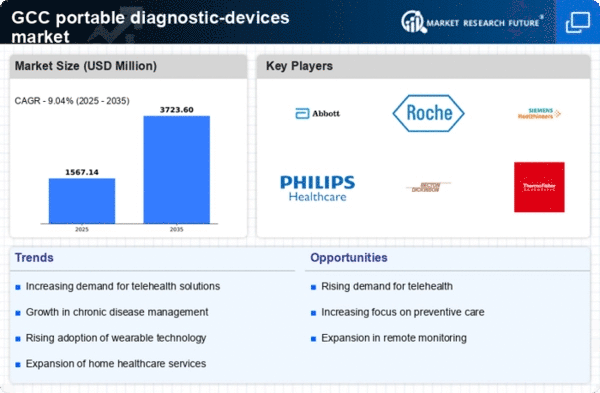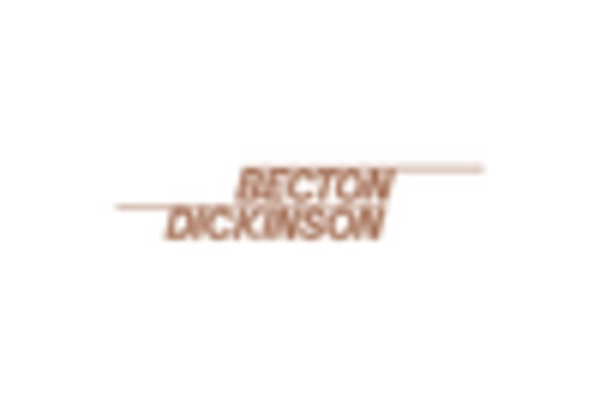Growing Aging Population
The demographic shift towards an aging population in the GCC is influencing the portable diagnostic-devices market. As the population aged 65 and above is projected to increase, there is a corresponding rise in the demand for healthcare services tailored to older adults. This demographic is often more susceptible to chronic conditions, which require regular monitoring. The portable diagnostic-devices market is likely to benefit from this trend, as these devices offer convenience and ease of use for elderly patients. Furthermore, the GCC governments are investing in healthcare infrastructure to support this aging population, further driving the market.
Increased Health Awareness
There is a notable rise in health awareness among the population in the GCC, which is significantly impacting the portable diagnostic-devices market. As individuals become more conscious of their health and wellness, the demand for personal health monitoring devices is increasing. This trend is reflected in the growing sales of portable diagnostic devices, as consumers seek tools that empower them to take charge of their health. The market is likely to see a surge in demand for devices that provide immediate feedback and facilitate preventive healthcare measures, aligning with the broader shift towards proactive health management.
Rising Prevalence of Chronic Diseases
The increasing incidence of chronic diseases in the GCC region is a primary driver for the portable diagnostic-devices market. Conditions such as diabetes, cardiovascular diseases, and respiratory disorders are becoming more prevalent, necessitating continuous monitoring and management. According to health statistics, the prevalence of diabetes in the GCC is estimated to be around 16.3%, significantly higher than the global average. This trend compels healthcare providers and patients to seek portable diagnostic solutions that facilitate timely interventions. The portable diagnostic-devices market is thus positioned to grow as healthcare systems adapt to the rising demand for effective disease management tools.
Government Initiatives and Investments
Government initiatives aimed at enhancing healthcare accessibility and quality in the GCC are driving the portable diagnostic-devices market. Various national health strategies emphasize the importance of early diagnosis and continuous monitoring, leading to increased funding for healthcare technologies. For instance, the GCC governments are investing heavily in telemedicine and remote patient monitoring solutions, which often incorporate portable diagnostic devices. This supportive regulatory environment is likely to foster innovation and growth within the market, as stakeholders are encouraged to develop and deploy advanced diagnostic solutions that meet the evolving needs of the population.
Technological Integration in Healthcare
The integration of advanced technologies, such as artificial intelligence (AI) and the Internet of Things (IoT), into healthcare is propelling the portable diagnostic-devices market. These technologies enhance the functionality and efficiency of diagnostic devices. These technologies enhance the functionality and efficiency of diagnostic devices, allowing for real-time data collection and analysis. In the GCC, healthcare providers are increasingly adopting these innovations to improve patient outcomes. The market for portable diagnostic devices is expected to expand as these technologies become more prevalent, with projections indicating a growth rate of approximately 10% annually. This technological evolution is likely to redefine patient care and monitoring.

















